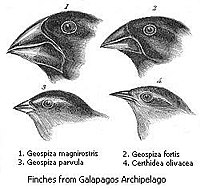
Production of plumage ornaments among males and females of two closely related tropical passerine bird species
Sign Up to like & getrecommendations! Published in 2017 at "Ecology and Evolution"
DOI: 10.1002/ece3.3000
Abstract: Abstract The evolution of elaborate secondary sexual traits (i.e., ornaments) is well‐studied in males but less so in females. Similarity in the appearance of ornaments between males and females supports the view that female ornaments… read more here.
Keywords: females two; production; closely related; males females ... See more keywords

Phylogeography of two closely related species of Allium endemic to East Asia: Population evolution in response to climate oscillations
Sign Up to like & getrecommendations! Published in 2018 at "Ecology and Evolution"
DOI: 10.1002/ece3.4338
Abstract: Abstract This study investigated the effects of climate oscillations on the evolution of two closely related Allium species, A. neriniflorum and A. tubiflorum. We sequenced three cp DNA (cpDNA) fragments (rps16, rpl32‐trnL, and trnD‐trnT, together… read more here.
Keywords: closely related; evolution; two closely; climate oscillations ... See more keywords

Helminth parasitism in two closely related South African rodents: abundance, prevalence, species richness and impinging factors
Sign Up to like & getrecommendations! Published in 2017 at "Parasitology Research"
DOI: 10.1007/s00436-017-5419-9
Abstract: We investigated patterns of helminth infection in two closely related rodents (social Rhabdomys pumilio occurring mainly in xeric habitats and solitary R. dilectus occurring mainly in mesic habitats) at 20 localities in different biomes of… read more here.
Keywords: closely related; infection; prevalence; species richness ... See more keywords

Beta diversity of gastrointestinal helminths in two closely related South African rodents: species and site contributions
Sign Up to like & getrecommendations! Published in 2019 at "Parasitology Research"
DOI: 10.1007/s00436-019-06411-w
Abstract: A fundamental aim of parasite ecology is to understand the mechanisms behind spatial variation in diversity and structure of parasite assemblages. To understand the contribution of individual parasite species and their assemblages to spatial variation… read more here.
Keywords: beta diversity; closely related; diversity; gastrointestinal helminths ... See more keywords

A comparison of the behaviour of two closely related xanthenyl-derived host compounds in the presence of vaporous dihaloalkanes
Sign Up to like & getrecommendations! Published in 2018 at "Journal of Inclusion Phenomena and Macrocyclic Chemistry"
DOI: 10.1007/s10847-018-0833-x
Abstract: The behaviour of two closely related xanthone-derived host compounds, N,N’-bis(9-phenyl-9-xanthenyl)ethylenediamine and N,N′-bis(9-phenyl-9-thioxanthenyl)ethylenediamine, which formed complexes with CH2Cl2, CH2Br2 and CH2I2 after recrystallization from each of these solvents, was compared when subjected to these guest and… read more here.
Keywords: closely related; behaviour two; host; two closely ... See more keywords

Floral fragrances in two closely related fruit fly orchids, Bulbophyllum hortorum and B. macranthoides (Orchidaceae): assortments of phenylbutanoids to attract tephritid fruit fly males
Sign Up to like & getrecommendations! Published in 2019 at "Applied Entomology and Zoology"
DOI: 10.1007/s13355-019-00653-x
Abstract: Floral chemical components are important cues used by plants to attract pollinators. One outstanding case is “fruit fly orchids” in the genus of Bulbophyllum to attract their pollinators by releasing characteristic fragrances. Dacini fruit flies… read more here.
Keywords: closely related; fruit; fly; fly orchids ... See more keywords

Nestlings of the common cuckoo do not mimic begging calls of two closely related Acrocephalus hosts
Sign Up to like & getrecommendations! Published in 2020 at "Animal Behaviour"
DOI: 10.1016/j.anbehav.2020.01.005
Abstract: Nestlings of the obligate brood-parasitic common cuckoo, Cuculus canorus, use diverse signals to manipulate host parents into feeding them. Begging calls, one of the most prominent parent–offspring communication signals, have been suggested to differ between… read more here.
Keywords: host species; begging calls; cuckoo; common cuckoo ... See more keywords

Artificial light at night affects sleep behaviour differently in two closely related songbird species.
Sign Up to like & getrecommendations! Published in 2017 at "Environmental pollution"
DOI: 10.1016/j.envpol.2017.08.098
Abstract: Artificial light at night (ALAN) or light pollution is an increasing and worldwide problem. There is growing concern that because of the disruption of natural light cycles, ALAN may pose serious risks for wildlife. While… read more here.
Keywords: sleep behaviour; closely related; nest boxes; two closely ... See more keywords

Two closely related polymorphs of ammonium trifluorooxovanadate
Sign Up to like & getrecommendations! Published in 2019 at "Journal of Solid State Chemistry"
DOI: 10.1016/j.jssc.2019.05.013
Abstract: Abstract Two polymorphs of ammonium trifluorooxovanadate (NH4VOF3) were synthesized as single crystals by the reaction of ammonium metavanadate with vanadium in hydrofluoric acid. The two phases crystalize in the same space group (Pbam), have similar… read more here.
Keywords: polymorphs ammonium; two closely; ammonium; ammonium trifluorooxovanadate ... See more keywords

Developmental dynamics of two closely related species Bombina bombina and B. variegata (Amphibia: Anura) in the context of their fossil evidence
Sign Up to like & getrecommendations! Published in 2021 at "Historical Biology"
DOI: 10.1080/08912963.2020.1867979
Abstract: The available fossil record of Bombina suggests that the genus appeared at the beginning of the Miocene. An isolated occurrence of early Miocene Bombina in Siberia, together with the relatively com... read more here.
Keywords: closely related; fossil; dynamics two; two closely ... See more keywords

Morphological and molecular differences in two closely related Calotes Cuvier, 1817 (Squamata: Agamidae: Draconinae) with the first record of Calotes medogensis Zhao & Li, 1984 from India.
Sign Up to like & getrecommendations! Published in 2022 at "Zootaxa"
DOI: 10.11646/zootaxa.5219.5.3
Abstract: We studied the morphological and genetic differences within Calotes jerdoni, a widespread species across northeast India. Our results suggest the presence of two distinct species in this region, one being Calotes jerdoni and the other being Calotes medogensis, which… read more here.
Keywords: calotes medogensis; molecular differences; two closely; morphological molecular ... See more keywords